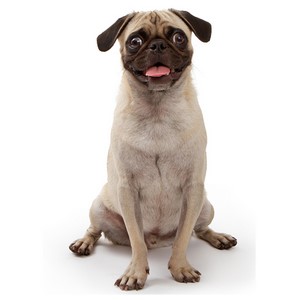Are Pugs Good For Apartments?
Are you living in an apartment unit or flat and thinking to adopt a Pug and want to know whether a Pug Dog is suitable for your apartment?
Well, Pug scores  out of 5 in the scale of apartment friendly dogs compare to other dog breeds.
out of 5 in the scale of apartment friendly dogs compare to other dog breeds.
Can Pugs Be Apartment Dogs?
-
The Pug is good for apartment life. It is relatively inactive indoors and will do okay without a yard. Cannot withstand hot or cold weather and should be kept indoors at a comfortable temperature.
Top 5 Apartment-Friendly Pet Dog Breeds
Personality, bark-levels and a low-energy count are all good traits to look for when on the hunt for an appropriate apartment canine. Below is a list of the top apartment frinedly breeds.
1. English Bulldog - Despite appearances, the English Bulldog is an uplifting dog that is more than happy to spend their days snoozing on the couch. They will barely bark, and are terrific with children in spite of their stocky build which has them weighing upwards of 22kg!
2. Pug - Love them or hate them, the humble pug is a lively and loyal dog. Pugs are a social breed, so their perfect home would involve another pet or plenty of human interaction. The pug is content to laze about all day, making him the perfect apartment buddy.
3. Chihuahua - While the Chihuahua calls for minimal exercise, making it perfect for a small home, it is very important that they receive correct training to avoid the yappy character they are known for. Weighing as little as 1kg, they are effortlessly carried around which is handy for individuals who travel.
4. Dachshund - Also known as the 'sausage dog', this friendly breed is extremely good with other dogs and children. While they can at first be somewhat difficult to train, they only need a small amount of exercise, due to their tiny legs!
5. Boston Terrier - Another breed great due to their size, the Boston Terrier will call for a daily walk to stay pleased, but they can be wonderful, caring breed who will remain mostly inactive while indoors.
What to do if you lose your Pug
If your Pug Dog or any other pet has gone missing and it does not have an identification tag with a phone number, you can:
1. Register your missing pet details at Pet Reunite website here.
2. Register the lost pet on the Local Facebook Lost Pets Groups Here.
3. Visit the nearby vet clinics to see if anyone has handed in your missing pet.
4. Telephone the RSPCA or Visit the RSPCA Lost Pets website and complete a Lost Pet Report.
5. Visit Lost Pets Pages of Animal Pounds.
What to do if you find a lost Pug
If you find a Pug Dog or any other pet and it does not have an identification tag with a phone number, you can:
1. Report the found pet details at Pet Reunite website here.
2. Register the missing pet on the Local Facebook Lost Pets Groups.
3. Call the Local Council to collect the lost animal.
4. Take the animal to the local Animal Pound near to your area.
5. Take the pet to the local Vet who can scan the animal’s microchip and phone the registered pet owner.
Laws Regarding Missing Pets
1. It is against the law to keep any animal that you find.
2. Pets are generally considered property and it is illegal to take and keep someone else’s property.
3. You must contact your local animal control unit and file a FOUND AN ANIMAL report for any dog or cat you find.
4. To reclaim your lost dog, cat or other pet from the animal shelter you must pay a release fee.
5. If your dog or cat is unregistered, you will have to register your pet before you can take it home.

